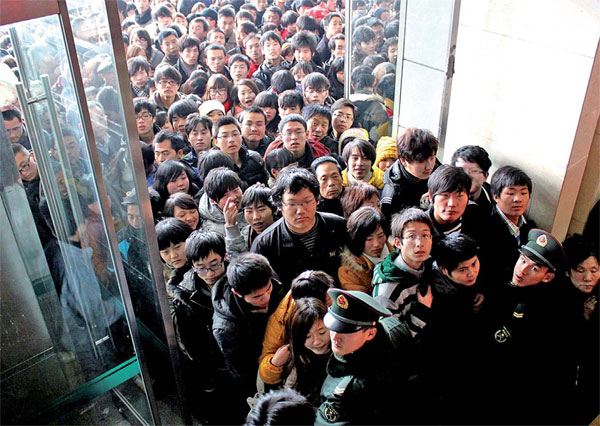Rail e-ticket sales get off-track
Updated: 2012-01-03 07:30
By Gao Changxin (China Daily)
|
|||||||||||
SHANGHAI - People planning trips home for the upcoming Spring Festival, which begins on Jan 23, may have been pleased to learn of the railways' new online ticket booking, but excitement has turned to frustration as huge Web traffic paralyzes the system, which at times cannot issue tickets already paid for.
 |
|
Passengers line up to buy tickets at a railway station in Hefei, capital of Anhui province, on Sunday. The online ticket booking system was made to spare travelers the discomforts of buying tickets at stations during peak seasons, but it has been challenged by problems, including high demand. [Photo/China Daily] |
In Shanghai, a college student named Yang wrote in an online forum that he paid more than 200 yuan ($32) for a ticket, but the booking website failed to place his order. He tried a second time and was successful, but he had to pay again, and he will have to wait to get that extra money back.
At least a dozen posts on online forums detail experiences similar to Yang's. Many other posts said the railway's telephone ticket hotline is easier to use and more reliable.
Meanwhile, the crowds at train stations are growing. The number of people waiting to buy tickets at stations in Guangzhou, Guangdong province, has dramatically increased in recent days, according to Chinese media.
China Railway Customer Service Center told China Daily on Monday it is trying to solve the problems and will return any extra payments within 15 working days.
A China Daily reporter logged onto the booking website, www.12306.cn, on Monday afternoon and tried without success to buy a ticket.
The site was noticeably slower than before and responded "system busy" after an order was made for a ticket from Shanghai to Guangzhou. Later attempts got the same response.
"The problem is because the current online purchase policy requires buyers to pay for the tickets within 20 minutes of booking them. If the website gets the payment any later, the ticket is put back with the unsold tickets to be sold again," the Ministry of Railways said on Monday.
Fan Yingshu, director of the transportation department of the Beijing Railway Bureau, said at a press conference on Friday that problems between banks and payment platforms caused the delay in payments.
To prevent such problems, the ministry said on Monday it has been working on extending the payment time. Efforts are also being made to increase the traffic the website can handle by increasing its network bandwidth.
Online ticket sales are a new service the ministry introduced for this year's chunyun - a period of heavy traveling around Chinese New Year when typically about 2 billion trips are made. The service is intended to spare many travelers the not uncommon experience of waiting overnight in the cold of winter in a line to buy train tickets.
But the system's vulnerability has become a hot topic online.
"I was excited by the news at first, figuring it would make buying train tickets much easier. But now it seems the effort is just window-dressing," said a netizen named "Acar".
Railway officials should have had the foresight to build a stronger system, anticipating the enormous demand the site would have to handle, Acar said.
In addition to online ticket booking, the ministry has also launched a real-name ticket system, aiming at preventing scalping. Passengers are allowed to buy only one ticket with one identity certificate, to prevent scalpers from stockpiling tickets for resale.
The real-name ticket system was adopted in June for high-speed trains. Since Sunday, it has been put in use with all kinds of train services.
To ensure the real-name system is effective in stopping the scalping during chunyun, railway officials have decided to have ticket holders' ID cards checked at the entrances of the rail stations in all major cities.
But that will also add to the waiting time at train stations, which are crowded with travelers during chunyun.









